Diagnosing Mental Illness: Methods, Systems, and Effectiveness Report
VerifiedAdded on 2020/10/05
|11
|3231
|456
Report
AI Summary
This report delves into the critical process of diagnosing mental illness within healthcare, focusing on psychological approaches to patient care, specifically for those suffering from depression and schizophrenia. It provides a detailed analysis of both psychological and biological explanations for mental disorders, comparing and contrasting their causes and impacts. The report further explores diagnostic methods used in the UK, including the application of the DSM-IV-TR, examining its reliability, validity, and addressing cultural considerations. It also evaluates the effectiveness of current diagnostic systems, supported by a case study, to provide a comprehensive understanding of the complexities involved in diagnosing and treating mental illness. The report highlights the significance of patient-centric decision-making and the importance of accurate diagnosis for effective treatment plans.
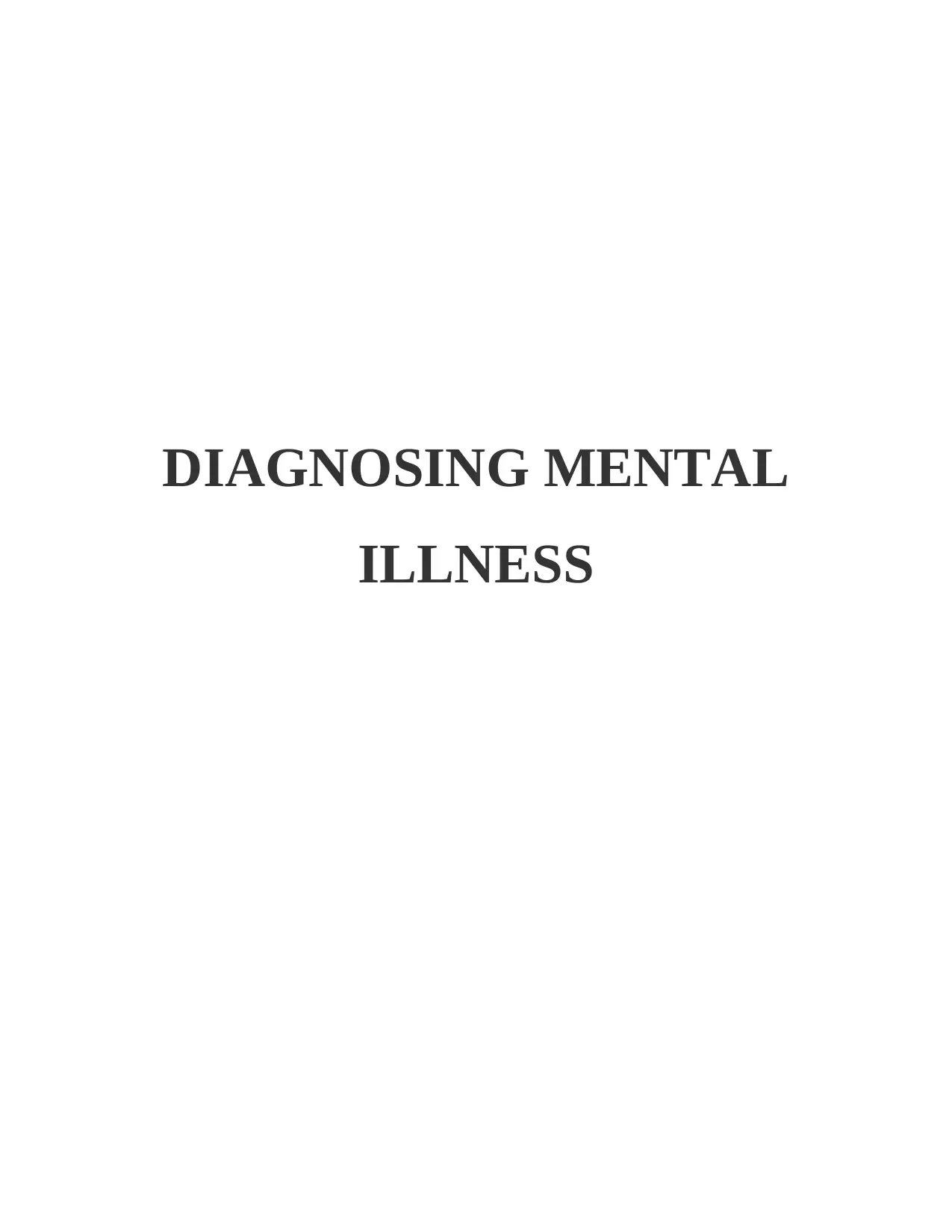
DIAGNOSING MENTAL
ILLNESS
ILLNESS
Paraphrase This Document
Need a fresh take? Get an instant paraphrase of this document with our AI Paraphraser
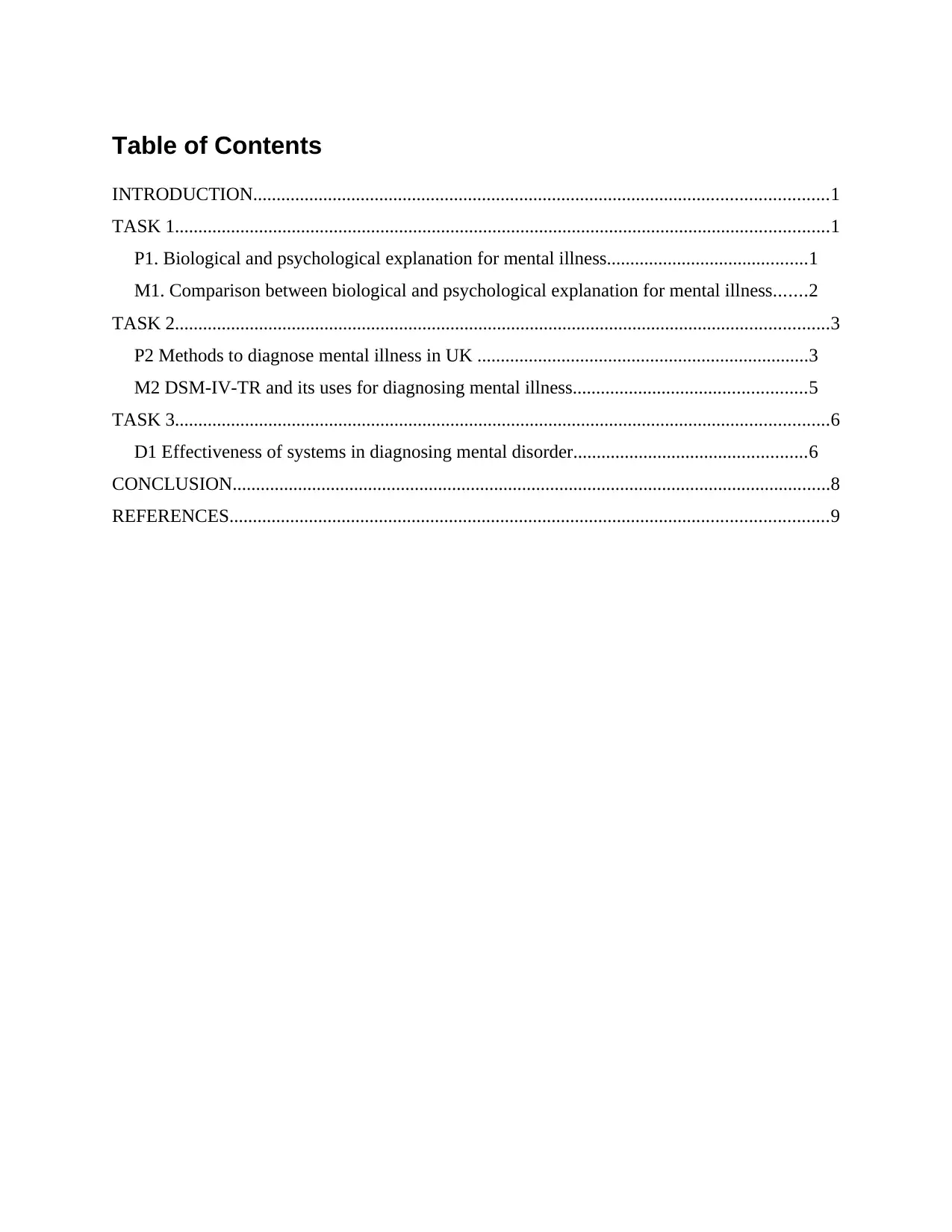
Table of Contents
INTRODUCTION...........................................................................................................................1
TASK 1............................................................................................................................................1
P1. Biological and psychological explanation for mental illness...........................................1
M1. Comparison between biological and psychological explanation for mental illness.......2
TASK 2............................................................................................................................................3
P2 Methods to diagnose mental illness in UK .......................................................................3
M2 DSM-IV-TR and its uses for diagnosing mental illness..................................................5
TASK 3............................................................................................................................................6
D1 Effectiveness of systems in diagnosing mental disorder..................................................6
CONCLUSION................................................................................................................................8
REFERENCES................................................................................................................................9
INTRODUCTION...........................................................................................................................1
TASK 1............................................................................................................................................1
P1. Biological and psychological explanation for mental illness...........................................1
M1. Comparison between biological and psychological explanation for mental illness.......2
TASK 2............................................................................................................................................3
P2 Methods to diagnose mental illness in UK .......................................................................3
M2 DSM-IV-TR and its uses for diagnosing mental illness..................................................5
TASK 3............................................................................................................................................6
D1 Effectiveness of systems in diagnosing mental disorder..................................................6
CONCLUSION................................................................................................................................8
REFERENCES................................................................................................................................9
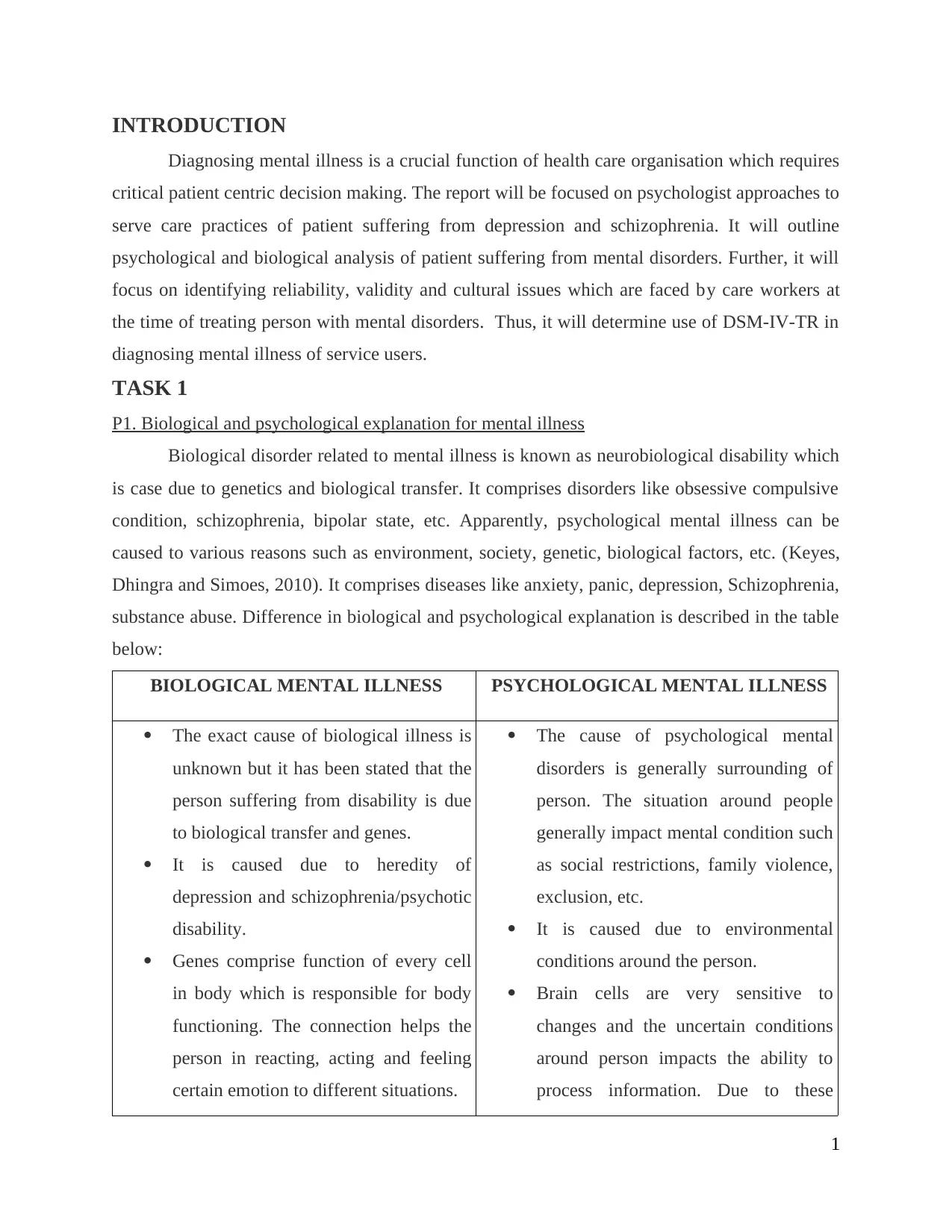
INTRODUCTION
Diagnosing mental illness is a crucial function of health care organisation which requires
critical patient centric decision making. The report will be focused on psychologist approaches to
serve care practices of patient suffering from depression and schizophrenia. It will outline
psychological and biological analysis of patient suffering from mental disorders. Further, it will
focus on identifying reliability, validity and cultural issues which are faced by care workers at
the time of treating person with mental disorders. Thus, it will determine use of DSM-IV-TR in
diagnosing mental illness of service users.
TASK 1
P1. Biological and psychological explanation for mental illness
Biological disorder related to mental illness is known as neurobiological disability which
is case due to genetics and biological transfer. It comprises disorders like obsessive compulsive
condition, schizophrenia, bipolar state, etc. Apparently, psychological mental illness can be
caused to various reasons such as environment, society, genetic, biological factors, etc. (Keyes,
Dhingra and Simoes, 2010). It comprises diseases like anxiety, panic, depression, Schizophrenia,
substance abuse. Difference in biological and psychological explanation is described in the table
below:
BIOLOGICAL MENTAL ILLNESS PSYCHOLOGICAL MENTAL ILLNESS
The exact cause of biological illness is
unknown but it has been stated that the
person suffering from disability is due
to biological transfer and genes.
It is caused due to heredity of
depression and schizophrenia/psychotic
disability.
Genes comprise function of every cell
in body which is responsible for body
functioning. The connection helps the
person in reacting, acting and feeling
certain emotion to different situations.
The cause of psychological mental
disorders is generally surrounding of
person. The situation around people
generally impact mental condition such
as social restrictions, family violence,
exclusion, etc.
It is caused due to environmental
conditions around the person.
Brain cells are very sensitive to
changes and the uncertain conditions
around person impacts the ability to
process information. Due to these
1
Diagnosing mental illness is a crucial function of health care organisation which requires
critical patient centric decision making. The report will be focused on psychologist approaches to
serve care practices of patient suffering from depression and schizophrenia. It will outline
psychological and biological analysis of patient suffering from mental disorders. Further, it will
focus on identifying reliability, validity and cultural issues which are faced by care workers at
the time of treating person with mental disorders. Thus, it will determine use of DSM-IV-TR in
diagnosing mental illness of service users.
TASK 1
P1. Biological and psychological explanation for mental illness
Biological disorder related to mental illness is known as neurobiological disability which
is case due to genetics and biological transfer. It comprises disorders like obsessive compulsive
condition, schizophrenia, bipolar state, etc. Apparently, psychological mental illness can be
caused to various reasons such as environment, society, genetic, biological factors, etc. (Keyes,
Dhingra and Simoes, 2010). It comprises diseases like anxiety, panic, depression, Schizophrenia,
substance abuse. Difference in biological and psychological explanation is described in the table
below:
BIOLOGICAL MENTAL ILLNESS PSYCHOLOGICAL MENTAL ILLNESS
The exact cause of biological illness is
unknown but it has been stated that the
person suffering from disability is due
to biological transfer and genes.
It is caused due to heredity of
depression and schizophrenia/psychotic
disability.
Genes comprise function of every cell
in body which is responsible for body
functioning. The connection helps the
person in reacting, acting and feeling
certain emotion to different situations.
The cause of psychological mental
disorders is generally surrounding of
person. The situation around people
generally impact mental condition such
as social restrictions, family violence,
exclusion, etc.
It is caused due to environmental
conditions around the person.
Brain cells are very sensitive to
changes and the uncertain conditions
around person impacts the ability to
process information. Due to these
1
⊘ This is a preview!⊘
Do you want full access?
Subscribe today to unlock all pages.

Trusted by 1+ million students worldwide
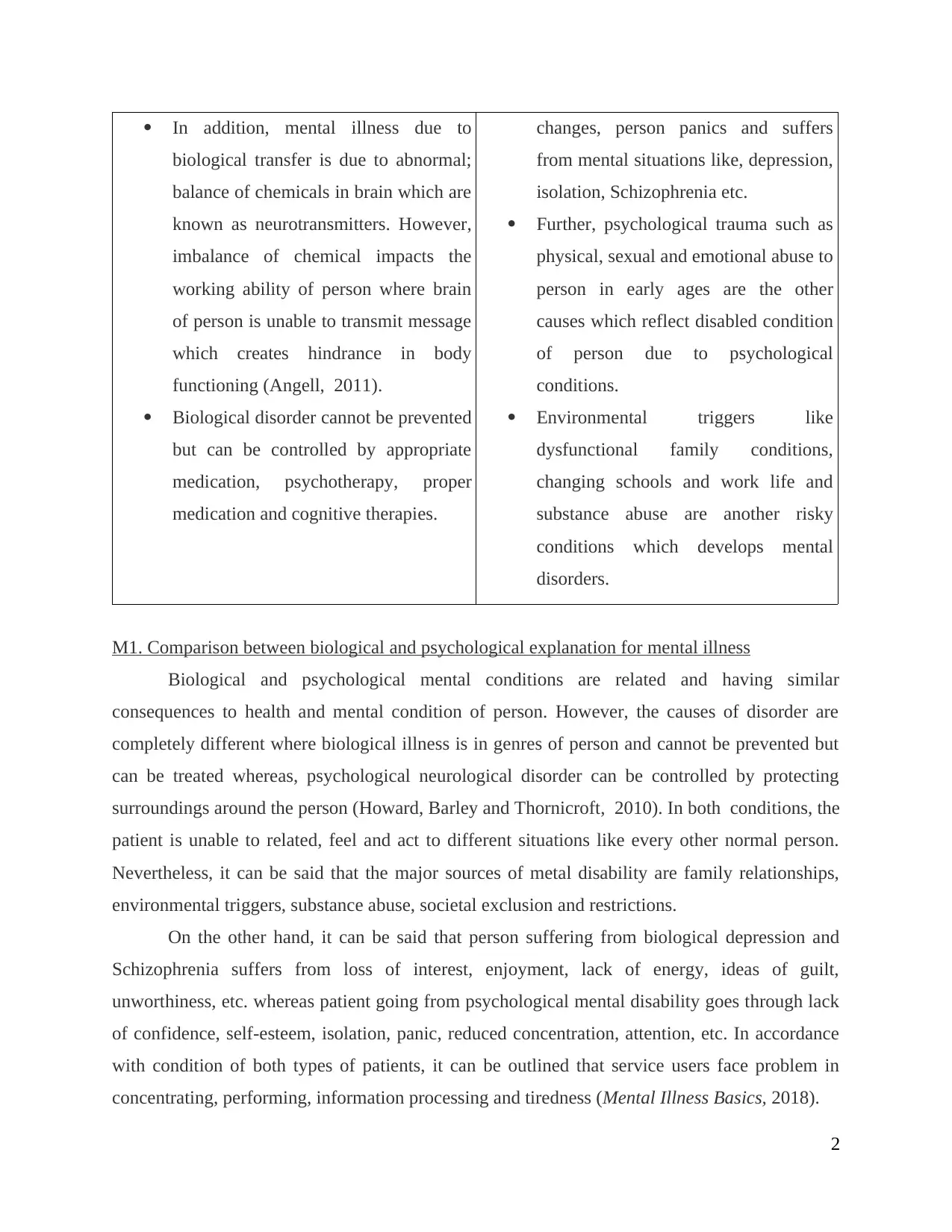
In addition, mental illness due to
biological transfer is due to abnormal;
balance of chemicals in brain which are
known as neurotransmitters. However,
imbalance of chemical impacts the
working ability of person where brain
of person is unable to transmit message
which creates hindrance in body
functioning (Angell, 2011).
Biological disorder cannot be prevented
but can be controlled by appropriate
medication, psychotherapy, proper
medication and cognitive therapies.
changes, person panics and suffers
from mental situations like, depression,
isolation, Schizophrenia etc.
Further, psychological trauma such as
physical, sexual and emotional abuse to
person in early ages are the other
causes which reflect disabled condition
of person due to psychological
conditions.
Environmental triggers like
dysfunctional family conditions,
changing schools and work life and
substance abuse are another risky
conditions which develops mental
disorders.
M1. Comparison between biological and psychological explanation for mental illness
Biological and psychological mental conditions are related and having similar
consequences to health and mental condition of person. However, the causes of disorder are
completely different where biological illness is in genres of person and cannot be prevented but
can be treated whereas, psychological neurological disorder can be controlled by protecting
surroundings around the person (Howard, Barley and Thornicroft, 2010). In both conditions, the
patient is unable to related, feel and act to different situations like every other normal person.
Nevertheless, it can be said that the major sources of metal disability are family relationships,
environmental triggers, substance abuse, societal exclusion and restrictions.
On the other hand, it can be said that person suffering from biological depression and
Schizophrenia suffers from loss of interest, enjoyment, lack of energy, ideas of guilt,
unworthiness, etc. whereas patient going from psychological mental disability goes through lack
of confidence, self-esteem, isolation, panic, reduced concentration, attention, etc. In accordance
with condition of both types of patients, it can be outlined that service users face problem in
concentrating, performing, information processing and tiredness (Mental Illness Basics, 2018).
2
biological transfer is due to abnormal;
balance of chemicals in brain which are
known as neurotransmitters. However,
imbalance of chemical impacts the
working ability of person where brain
of person is unable to transmit message
which creates hindrance in body
functioning (Angell, 2011).
Biological disorder cannot be prevented
but can be controlled by appropriate
medication, psychotherapy, proper
medication and cognitive therapies.
changes, person panics and suffers
from mental situations like, depression,
isolation, Schizophrenia etc.
Further, psychological trauma such as
physical, sexual and emotional abuse to
person in early ages are the other
causes which reflect disabled condition
of person due to psychological
conditions.
Environmental triggers like
dysfunctional family conditions,
changing schools and work life and
substance abuse are another risky
conditions which develops mental
disorders.
M1. Comparison between biological and psychological explanation for mental illness
Biological and psychological mental conditions are related and having similar
consequences to health and mental condition of person. However, the causes of disorder are
completely different where biological illness is in genres of person and cannot be prevented but
can be treated whereas, psychological neurological disorder can be controlled by protecting
surroundings around the person (Howard, Barley and Thornicroft, 2010). In both conditions, the
patient is unable to related, feel and act to different situations like every other normal person.
Nevertheless, it can be said that the major sources of metal disability are family relationships,
environmental triggers, substance abuse, societal exclusion and restrictions.
On the other hand, it can be said that person suffering from biological depression and
Schizophrenia suffers from loss of interest, enjoyment, lack of energy, ideas of guilt,
unworthiness, etc. whereas patient going from psychological mental disability goes through lack
of confidence, self-esteem, isolation, panic, reduced concentration, attention, etc. In accordance
with condition of both types of patients, it can be outlined that service users face problem in
concentrating, performing, information processing and tiredness (Mental Illness Basics, 2018).
2
Paraphrase This Document
Need a fresh take? Get an instant paraphrase of this document with our AI Paraphraser
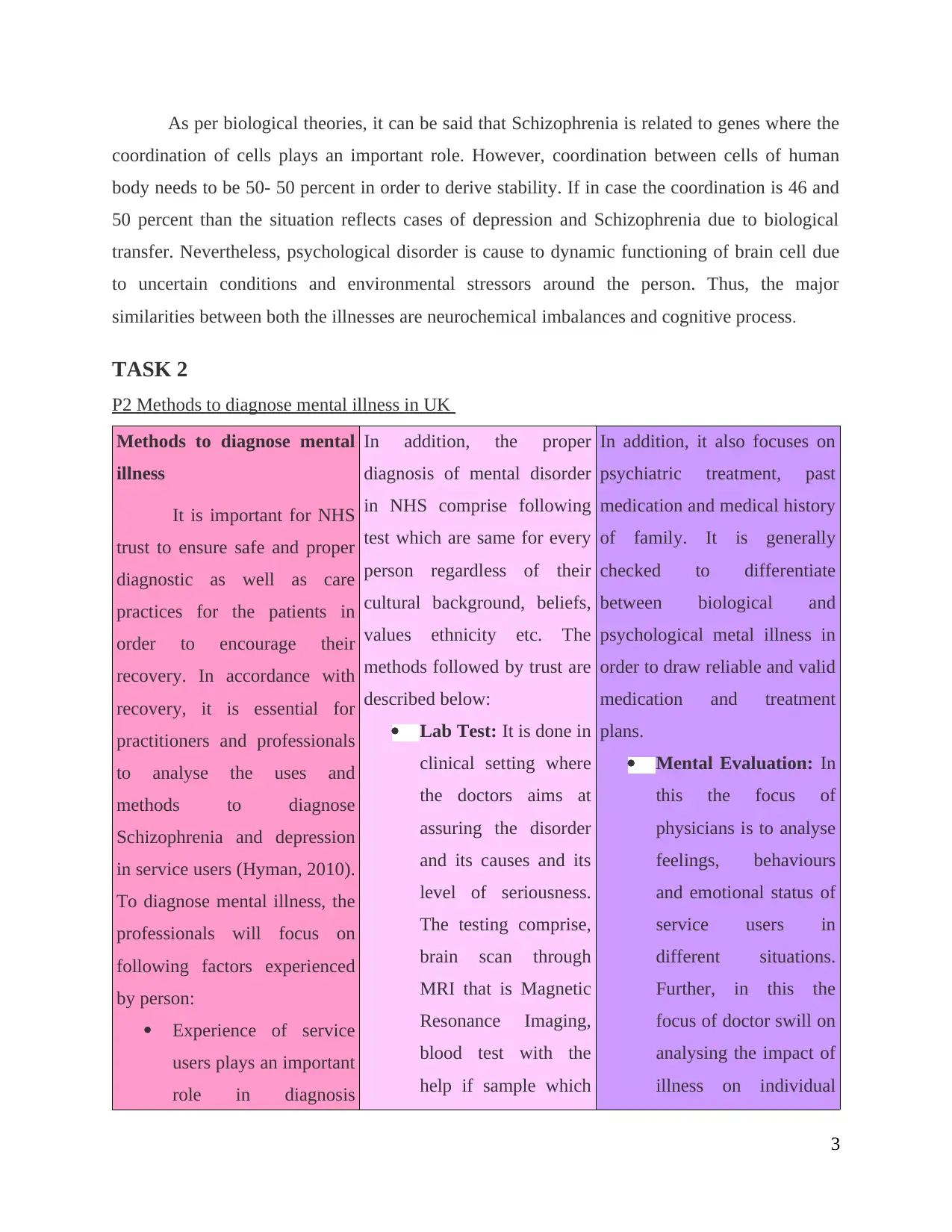
As per biological theories, it can be said that Schizophrenia is related to genes where the
coordination of cells plays an important role. However, coordination between cells of human
body needs to be 50- 50 percent in order to derive stability. If in case the coordination is 46 and
50 percent than the situation reflects cases of depression and Schizophrenia due to biological
transfer. Nevertheless, psychological disorder is cause to dynamic functioning of brain cell due
to uncertain conditions and environmental stressors around the person. Thus, the major
similarities between both the illnesses are neurochemical imbalances and cognitive process.
TASK 2
P2 Methods to diagnose mental illness in UK
Methods to diagnose mental
illness
It is important for NHS
trust to ensure safe and proper
diagnostic as well as care
practices for the patients in
order to encourage their
recovery. In accordance with
recovery, it is essential for
practitioners and professionals
to analyse the uses and
methods to diagnose
Schizophrenia and depression
in service users (Hyman, 2010).
To diagnose mental illness, the
professionals will focus on
following factors experienced
by person:
Experience of service
users plays an important
role in diagnosis
In addition, the proper
diagnosis of mental disorder
in NHS comprise following
test which are same for every
person regardless of their
cultural background, beliefs,
values ethnicity etc. The
methods followed by trust are
described below:
Lab Test: It is done in
clinical setting where
the doctors aims at
assuring the disorder
and its causes and its
level of seriousness.
The testing comprise,
brain scan through
MRI that is Magnetic
Resonance Imaging,
blood test with the
help if sample which
In addition, it also focuses on
psychiatric treatment, past
medication and medical history
of family. It is generally
checked to differentiate
between biological and
psychological metal illness in
order to draw reliable and valid
medication and treatment
plans.
Mental Evaluation: In
this the focus of
physicians is to analyse
feelings, behaviours
and emotional status of
service users in
different situations.
Further, in this the
focus of doctor swill on
analysing the impact of
illness on individual
3
coordination of cells plays an important role. However, coordination between cells of human
body needs to be 50- 50 percent in order to derive stability. If in case the coordination is 46 and
50 percent than the situation reflects cases of depression and Schizophrenia due to biological
transfer. Nevertheless, psychological disorder is cause to dynamic functioning of brain cell due
to uncertain conditions and environmental stressors around the person. Thus, the major
similarities between both the illnesses are neurochemical imbalances and cognitive process.
TASK 2
P2 Methods to diagnose mental illness in UK
Methods to diagnose mental
illness
It is important for NHS
trust to ensure safe and proper
diagnostic as well as care
practices for the patients in
order to encourage their
recovery. In accordance with
recovery, it is essential for
practitioners and professionals
to analyse the uses and
methods to diagnose
Schizophrenia and depression
in service users (Hyman, 2010).
To diagnose mental illness, the
professionals will focus on
following factors experienced
by person:
Experience of service
users plays an important
role in diagnosis
In addition, the proper
diagnosis of mental disorder
in NHS comprise following
test which are same for every
person regardless of their
cultural background, beliefs,
values ethnicity etc. The
methods followed by trust are
described below:
Lab Test: It is done in
clinical setting where
the doctors aims at
assuring the disorder
and its causes and its
level of seriousness.
The testing comprise,
brain scan through
MRI that is Magnetic
Resonance Imaging,
blood test with the
help if sample which
In addition, it also focuses on
psychiatric treatment, past
medication and medical history
of family. It is generally
checked to differentiate
between biological and
psychological metal illness in
order to draw reliable and valid
medication and treatment
plans.
Mental Evaluation: In
this the focus of
physicians is to analyse
feelings, behaviours
and emotional status of
service users in
different situations.
Further, in this the
focus of doctor swill on
analysing the impact of
illness on individual
3
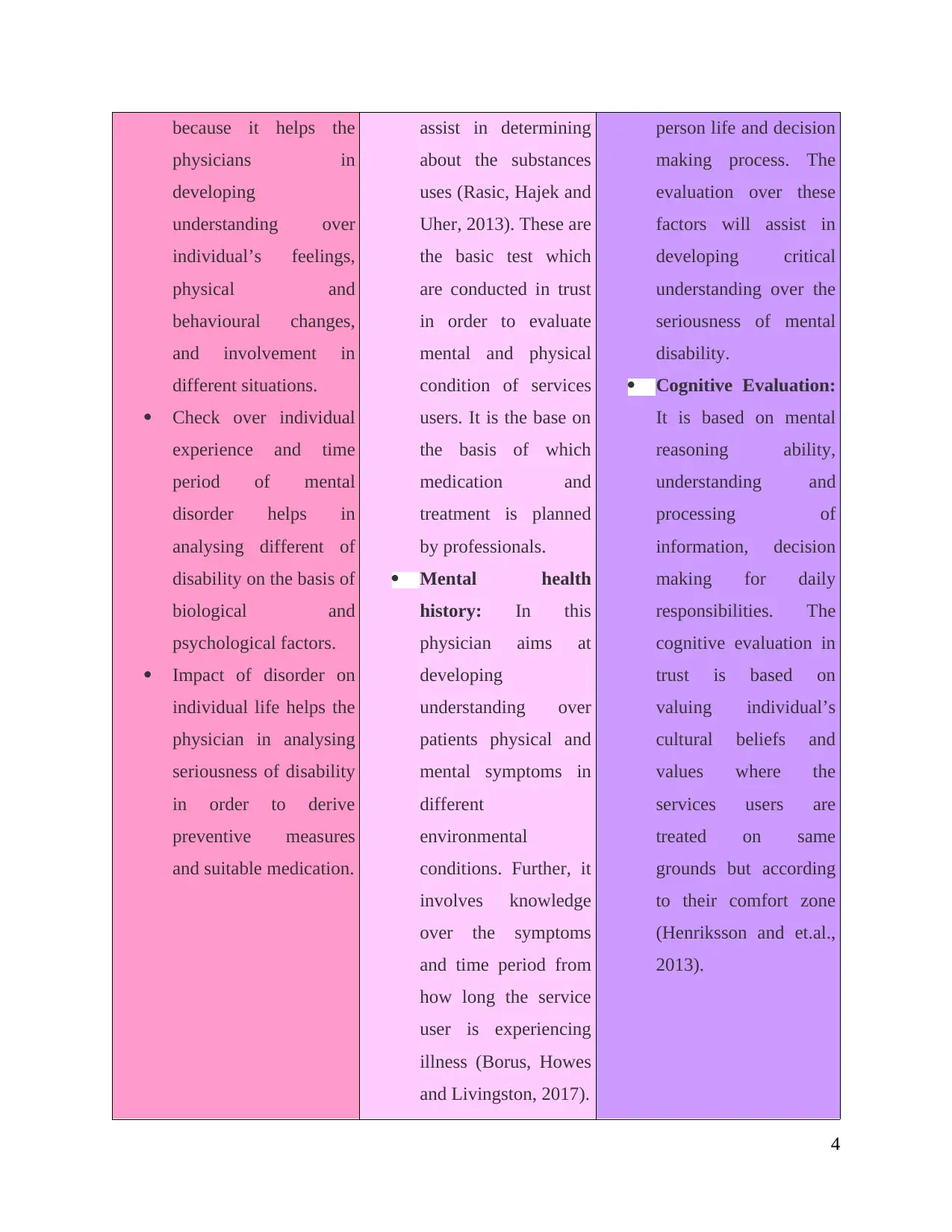
because it helps the
physicians in
developing
understanding over
individual’s feelings,
physical and
behavioural changes,
and involvement in
different situations.
Check over individual
experience and time
period of mental
disorder helps in
analysing different of
disability on the basis of
biological and
psychological factors.
Impact of disorder on
individual life helps the
physician in analysing
seriousness of disability
in order to derive
preventive measures
and suitable medication.
assist in determining
about the substances
uses (Rasic, Hajek and
Uher, 2013). These are
the basic test which
are conducted in trust
in order to evaluate
mental and physical
condition of services
users. It is the base on
the basis of which
medication and
treatment is planned
by professionals.
Mental health
history: In this
physician aims at
developing
understanding over
patients physical and
mental symptoms in
different
environmental
conditions. Further, it
involves knowledge
over the symptoms
and time period from
how long the service
user is experiencing
illness (Borus, Howes
and Livingston, 2017).
person life and decision
making process. The
evaluation over these
factors will assist in
developing critical
understanding over the
seriousness of mental
disability.
Cognitive Evaluation:
It is based on mental
reasoning ability,
understanding and
processing of
information, decision
making for daily
responsibilities. The
cognitive evaluation in
trust is based on
valuing individual’s
cultural beliefs and
values where the
services users are
treated on same
grounds but according
to their comfort zone
(Henriksson and et.al.,
2013).
4
physicians in
developing
understanding over
individual’s feelings,
physical and
behavioural changes,
and involvement in
different situations.
Check over individual
experience and time
period of mental
disorder helps in
analysing different of
disability on the basis of
biological and
psychological factors.
Impact of disorder on
individual life helps the
physician in analysing
seriousness of disability
in order to derive
preventive measures
and suitable medication.
assist in determining
about the substances
uses (Rasic, Hajek and
Uher, 2013). These are
the basic test which
are conducted in trust
in order to evaluate
mental and physical
condition of services
users. It is the base on
the basis of which
medication and
treatment is planned
by professionals.
Mental health
history: In this
physician aims at
developing
understanding over
patients physical and
mental symptoms in
different
environmental
conditions. Further, it
involves knowledge
over the symptoms
and time period from
how long the service
user is experiencing
illness (Borus, Howes
and Livingston, 2017).
person life and decision
making process. The
evaluation over these
factors will assist in
developing critical
understanding over the
seriousness of mental
disability.
Cognitive Evaluation:
It is based on mental
reasoning ability,
understanding and
processing of
information, decision
making for daily
responsibilities. The
cognitive evaluation in
trust is based on
valuing individual’s
cultural beliefs and
values where the
services users are
treated on same
grounds but according
to their comfort zone
(Henriksson and et.al.,
2013).
4
⊘ This is a preview!⊘
Do you want full access?
Subscribe today to unlock all pages.

Trusted by 1+ million students worldwide
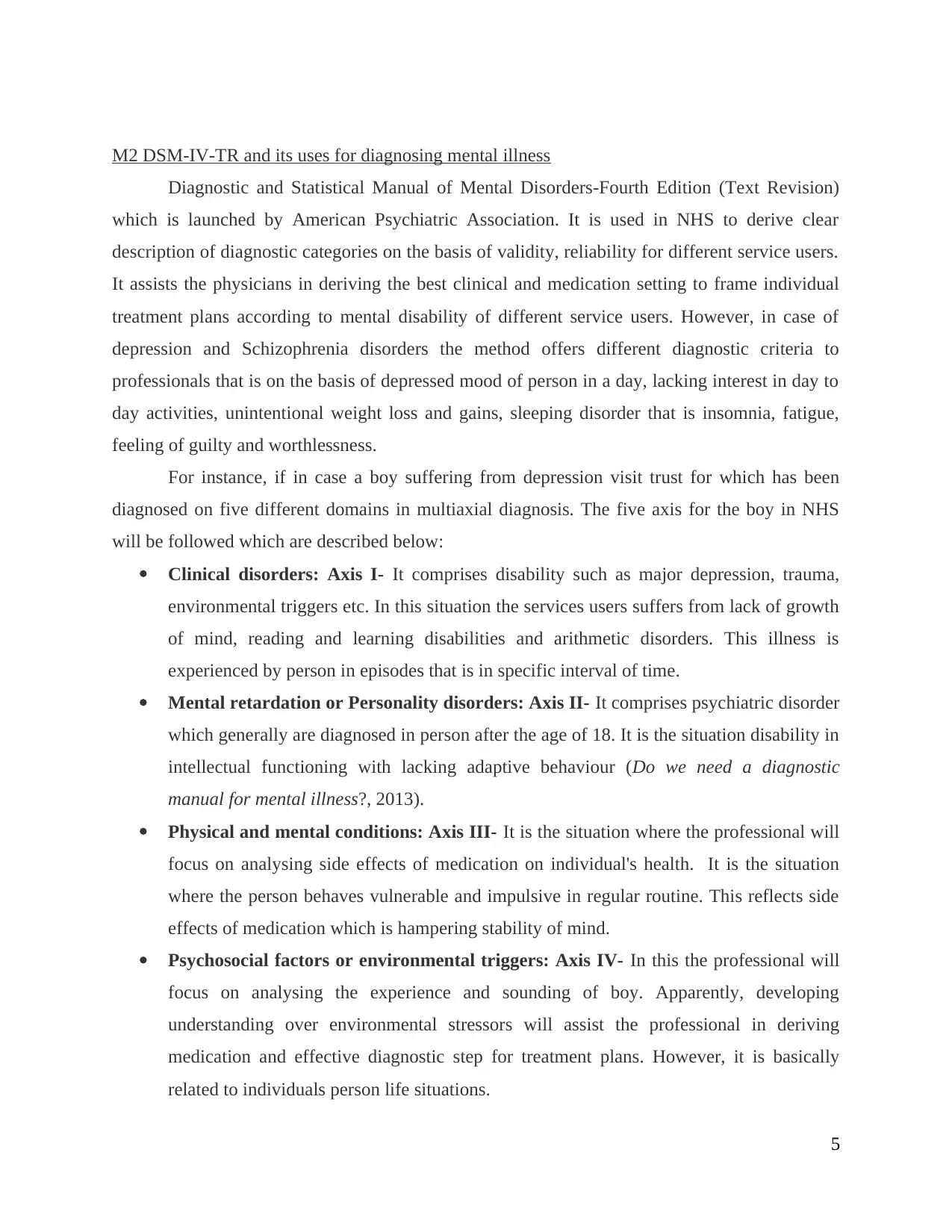
M2 DSM-IV-TR and its uses for diagnosing mental illness
Diagnostic and Statistical Manual of Mental Disorders-Fourth Edition (Text Revision)
which is launched by American Psychiatric Association. It is used in NHS to derive clear
description of diagnostic categories on the basis of validity, reliability for different service users.
It assists the physicians in deriving the best clinical and medication setting to frame individual
treatment plans according to mental disability of different service users. However, in case of
depression and Schizophrenia disorders the method offers different diagnostic criteria to
professionals that is on the basis of depressed mood of person in a day, lacking interest in day to
day activities, unintentional weight loss and gains, sleeping disorder that is insomnia, fatigue,
feeling of guilty and worthlessness.
For instance, if in case a boy suffering from depression visit trust for which has been
diagnosed on five different domains in multiaxial diagnosis. The five axis for the boy in NHS
will be followed which are described below:
Clinical disorders: Axis I- It comprises disability such as major depression, trauma,
environmental triggers etc. In this situation the services users suffers from lack of growth
of mind, reading and learning disabilities and arithmetic disorders. This illness is
experienced by person in episodes that is in specific interval of time.
Mental retardation or Personality disorders: Axis II- It comprises psychiatric disorder
which generally are diagnosed in person after the age of 18. It is the situation disability in
intellectual functioning with lacking adaptive behaviour (Do we need a diagnostic
manual for mental illness?, 2013).
Physical and mental conditions: Axis III- It is the situation where the professional will
focus on analysing side effects of medication on individual's health. It is the situation
where the person behaves vulnerable and impulsive in regular routine. This reflects side
effects of medication which is hampering stability of mind.
Psychosocial factors or environmental triggers: Axis IV- In this the professional will
focus on analysing the experience and sounding of boy. Apparently, developing
understanding over environmental stressors will assist the professional in deriving
medication and effective diagnostic step for treatment plans. However, it is basically
related to individuals person life situations.
5
Diagnostic and Statistical Manual of Mental Disorders-Fourth Edition (Text Revision)
which is launched by American Psychiatric Association. It is used in NHS to derive clear
description of diagnostic categories on the basis of validity, reliability for different service users.
It assists the physicians in deriving the best clinical and medication setting to frame individual
treatment plans according to mental disability of different service users. However, in case of
depression and Schizophrenia disorders the method offers different diagnostic criteria to
professionals that is on the basis of depressed mood of person in a day, lacking interest in day to
day activities, unintentional weight loss and gains, sleeping disorder that is insomnia, fatigue,
feeling of guilty and worthlessness.
For instance, if in case a boy suffering from depression visit trust for which has been
diagnosed on five different domains in multiaxial diagnosis. The five axis for the boy in NHS
will be followed which are described below:
Clinical disorders: Axis I- It comprises disability such as major depression, trauma,
environmental triggers etc. In this situation the services users suffers from lack of growth
of mind, reading and learning disabilities and arithmetic disorders. This illness is
experienced by person in episodes that is in specific interval of time.
Mental retardation or Personality disorders: Axis II- It comprises psychiatric disorder
which generally are diagnosed in person after the age of 18. It is the situation disability in
intellectual functioning with lacking adaptive behaviour (Do we need a diagnostic
manual for mental illness?, 2013).
Physical and mental conditions: Axis III- It is the situation where the professional will
focus on analysing side effects of medication on individual's health. It is the situation
where the person behaves vulnerable and impulsive in regular routine. This reflects side
effects of medication which is hampering stability of mind.
Psychosocial factors or environmental triggers: Axis IV- In this the professional will
focus on analysing the experience and sounding of boy. Apparently, developing
understanding over environmental stressors will assist the professional in deriving
medication and effective diagnostic step for treatment plans. However, it is basically
related to individuals person life situations.
5
Paraphrase This Document
Need a fresh take? Get an instant paraphrase of this document with our AI Paraphraser
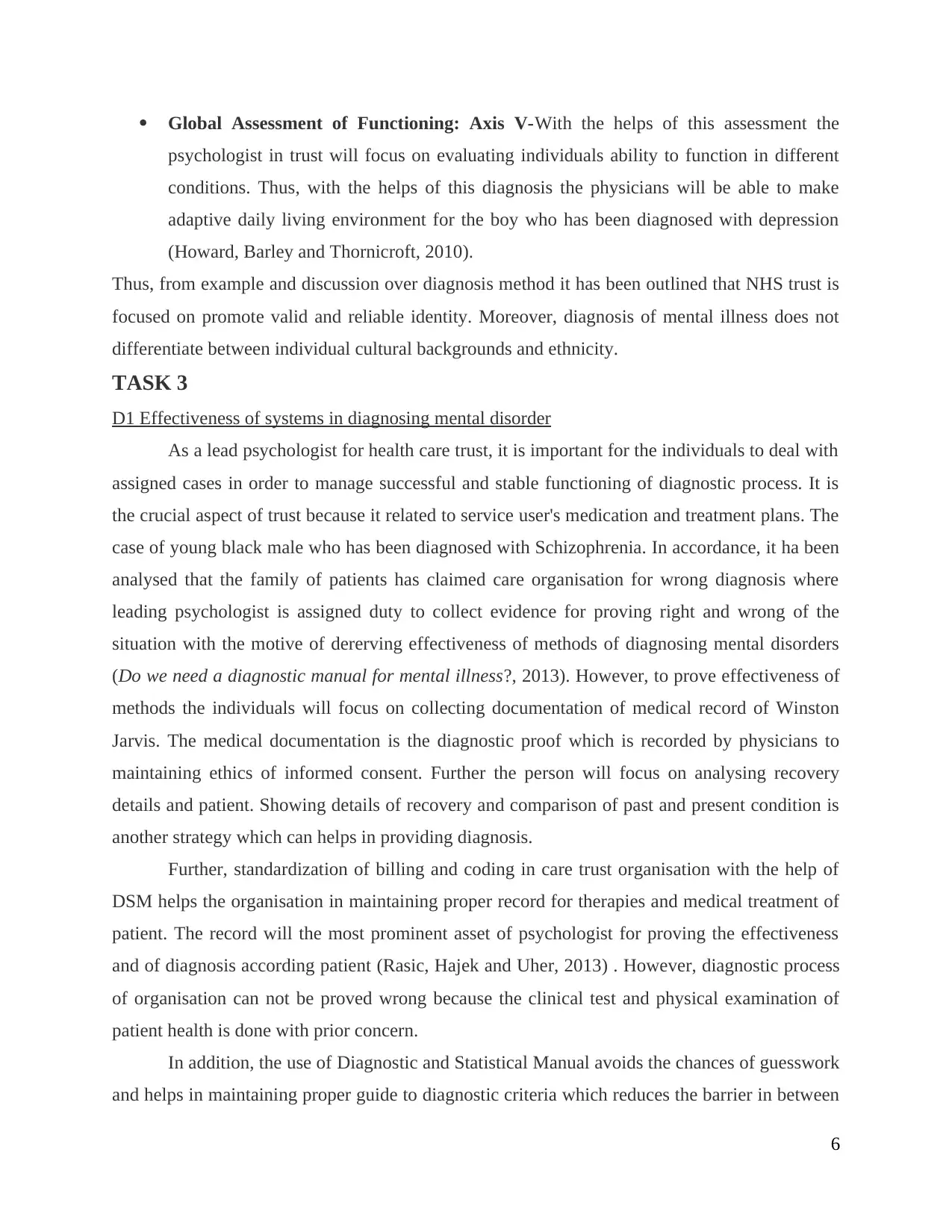
Global Assessment of Functioning: Axis V-With the helps of this assessment the
psychologist in trust will focus on evaluating individuals ability to function in different
conditions. Thus, with the helps of this diagnosis the physicians will be able to make
adaptive daily living environment for the boy who has been diagnosed with depression
(Howard, Barley and Thornicroft, 2010).
Thus, from example and discussion over diagnosis method it has been outlined that NHS trust is
focused on promote valid and reliable identity. Moreover, diagnosis of mental illness does not
differentiate between individual cultural backgrounds and ethnicity.
TASK 3
D1 Effectiveness of systems in diagnosing mental disorder
As a lead psychologist for health care trust, it is important for the individuals to deal with
assigned cases in order to manage successful and stable functioning of diagnostic process. It is
the crucial aspect of trust because it related to service user's medication and treatment plans. The
case of young black male who has been diagnosed with Schizophrenia. In accordance, it ha been
analysed that the family of patients has claimed care organisation for wrong diagnosis where
leading psychologist is assigned duty to collect evidence for proving right and wrong of the
situation with the motive of dererving effectiveness of methods of diagnosing mental disorders
(Do we need a diagnostic manual for mental illness?, 2013). However, to prove effectiveness of
methods the individuals will focus on collecting documentation of medical record of Winston
Jarvis. The medical documentation is the diagnostic proof which is recorded by physicians to
maintaining ethics of informed consent. Further the person will focus on analysing recovery
details and patient. Showing details of recovery and comparison of past and present condition is
another strategy which can helps in providing diagnosis.
Further, standardization of billing and coding in care trust organisation with the help of
DSM helps the organisation in maintaining proper record for therapies and medical treatment of
patient. The record will the most prominent asset of psychologist for proving the effectiveness
and of diagnosis according patient (Rasic, Hajek and Uher, 2013) . However, diagnostic process
of organisation can not be proved wrong because the clinical test and physical examination of
patient health is done with prior concern.
In addition, the use of Diagnostic and Statistical Manual avoids the chances of guesswork
and helps in maintaining proper guide to diagnostic criteria which reduces the barrier in between
6
psychologist in trust will focus on evaluating individuals ability to function in different
conditions. Thus, with the helps of this diagnosis the physicians will be able to make
adaptive daily living environment for the boy who has been diagnosed with depression
(Howard, Barley and Thornicroft, 2010).
Thus, from example and discussion over diagnosis method it has been outlined that NHS trust is
focused on promote valid and reliable identity. Moreover, diagnosis of mental illness does not
differentiate between individual cultural backgrounds and ethnicity.
TASK 3
D1 Effectiveness of systems in diagnosing mental disorder
As a lead psychologist for health care trust, it is important for the individuals to deal with
assigned cases in order to manage successful and stable functioning of diagnostic process. It is
the crucial aspect of trust because it related to service user's medication and treatment plans. The
case of young black male who has been diagnosed with Schizophrenia. In accordance, it ha been
analysed that the family of patients has claimed care organisation for wrong diagnosis where
leading psychologist is assigned duty to collect evidence for proving right and wrong of the
situation with the motive of dererving effectiveness of methods of diagnosing mental disorders
(Do we need a diagnostic manual for mental illness?, 2013). However, to prove effectiveness of
methods the individuals will focus on collecting documentation of medical record of Winston
Jarvis. The medical documentation is the diagnostic proof which is recorded by physicians to
maintaining ethics of informed consent. Further the person will focus on analysing recovery
details and patient. Showing details of recovery and comparison of past and present condition is
another strategy which can helps in providing diagnosis.
Further, standardization of billing and coding in care trust organisation with the help of
DSM helps the organisation in maintaining proper record for therapies and medical treatment of
patient. The record will the most prominent asset of psychologist for proving the effectiveness
and of diagnosis according patient (Rasic, Hajek and Uher, 2013) . However, diagnostic process
of organisation can not be proved wrong because the clinical test and physical examination of
patient health is done with prior concern.
In addition, the use of Diagnostic and Statistical Manual avoids the chances of guesswork
and helps in maintaining proper guide to diagnostic criteria which reduces the barrier in between
6
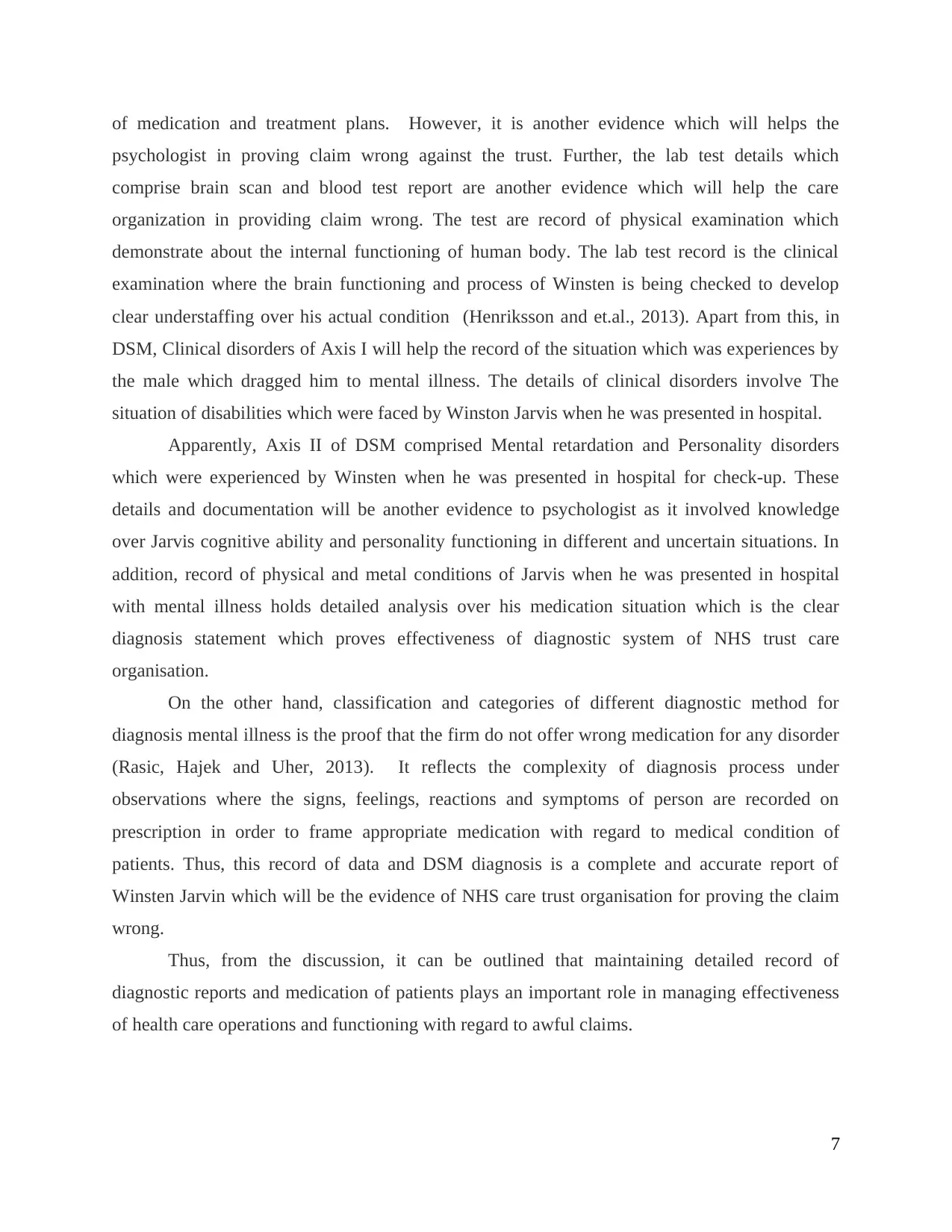
of medication and treatment plans. However, it is another evidence which will helps the
psychologist in proving claim wrong against the trust. Further, the lab test details which
comprise brain scan and blood test report are another evidence which will help the care
organization in providing claim wrong. The test are record of physical examination which
demonstrate about the internal functioning of human body. The lab test record is the clinical
examination where the brain functioning and process of Winsten is being checked to develop
clear understaffing over his actual condition (Henriksson and et.al., 2013). Apart from this, in
DSM, Clinical disorders of Axis I will help the record of the situation which was experiences by
the male which dragged him to mental illness. The details of clinical disorders involve The
situation of disabilities which were faced by Winston Jarvis when he was presented in hospital.
Apparently, Axis II of DSM comprised Mental retardation and Personality disorders
which were experienced by Winsten when he was presented in hospital for check-up. These
details and documentation will be another evidence to psychologist as it involved knowledge
over Jarvis cognitive ability and personality functioning in different and uncertain situations. In
addition, record of physical and metal conditions of Jarvis when he was presented in hospital
with mental illness holds detailed analysis over his medication situation which is the clear
diagnosis statement which proves effectiveness of diagnostic system of NHS trust care
organisation.
On the other hand, classification and categories of different diagnostic method for
diagnosis mental illness is the proof that the firm do not offer wrong medication for any disorder
(Rasic, Hajek and Uher, 2013). It reflects the complexity of diagnosis process under
observations where the signs, feelings, reactions and symptoms of person are recorded on
prescription in order to frame appropriate medication with regard to medical condition of
patients. Thus, this record of data and DSM diagnosis is a complete and accurate report of
Winsten Jarvin which will be the evidence of NHS care trust organisation for proving the claim
wrong.
Thus, from the discussion, it can be outlined that maintaining detailed record of
diagnostic reports and medication of patients plays an important role in managing effectiveness
of health care operations and functioning with regard to awful claims.
7
psychologist in proving claim wrong against the trust. Further, the lab test details which
comprise brain scan and blood test report are another evidence which will help the care
organization in providing claim wrong. The test are record of physical examination which
demonstrate about the internal functioning of human body. The lab test record is the clinical
examination where the brain functioning and process of Winsten is being checked to develop
clear understaffing over his actual condition (Henriksson and et.al., 2013). Apart from this, in
DSM, Clinical disorders of Axis I will help the record of the situation which was experiences by
the male which dragged him to mental illness. The details of clinical disorders involve The
situation of disabilities which were faced by Winston Jarvis when he was presented in hospital.
Apparently, Axis II of DSM comprised Mental retardation and Personality disorders
which were experienced by Winsten when he was presented in hospital for check-up. These
details and documentation will be another evidence to psychologist as it involved knowledge
over Jarvis cognitive ability and personality functioning in different and uncertain situations. In
addition, record of physical and metal conditions of Jarvis when he was presented in hospital
with mental illness holds detailed analysis over his medication situation which is the clear
diagnosis statement which proves effectiveness of diagnostic system of NHS trust care
organisation.
On the other hand, classification and categories of different diagnostic method for
diagnosis mental illness is the proof that the firm do not offer wrong medication for any disorder
(Rasic, Hajek and Uher, 2013). It reflects the complexity of diagnosis process under
observations where the signs, feelings, reactions and symptoms of person are recorded on
prescription in order to frame appropriate medication with regard to medical condition of
patients. Thus, this record of data and DSM diagnosis is a complete and accurate report of
Winsten Jarvin which will be the evidence of NHS care trust organisation for proving the claim
wrong.
Thus, from the discussion, it can be outlined that maintaining detailed record of
diagnostic reports and medication of patients plays an important role in managing effectiveness
of health care operations and functioning with regard to awful claims.
7
⊘ This is a preview!⊘
Do you want full access?
Subscribe today to unlock all pages.

Trusted by 1+ million students worldwide
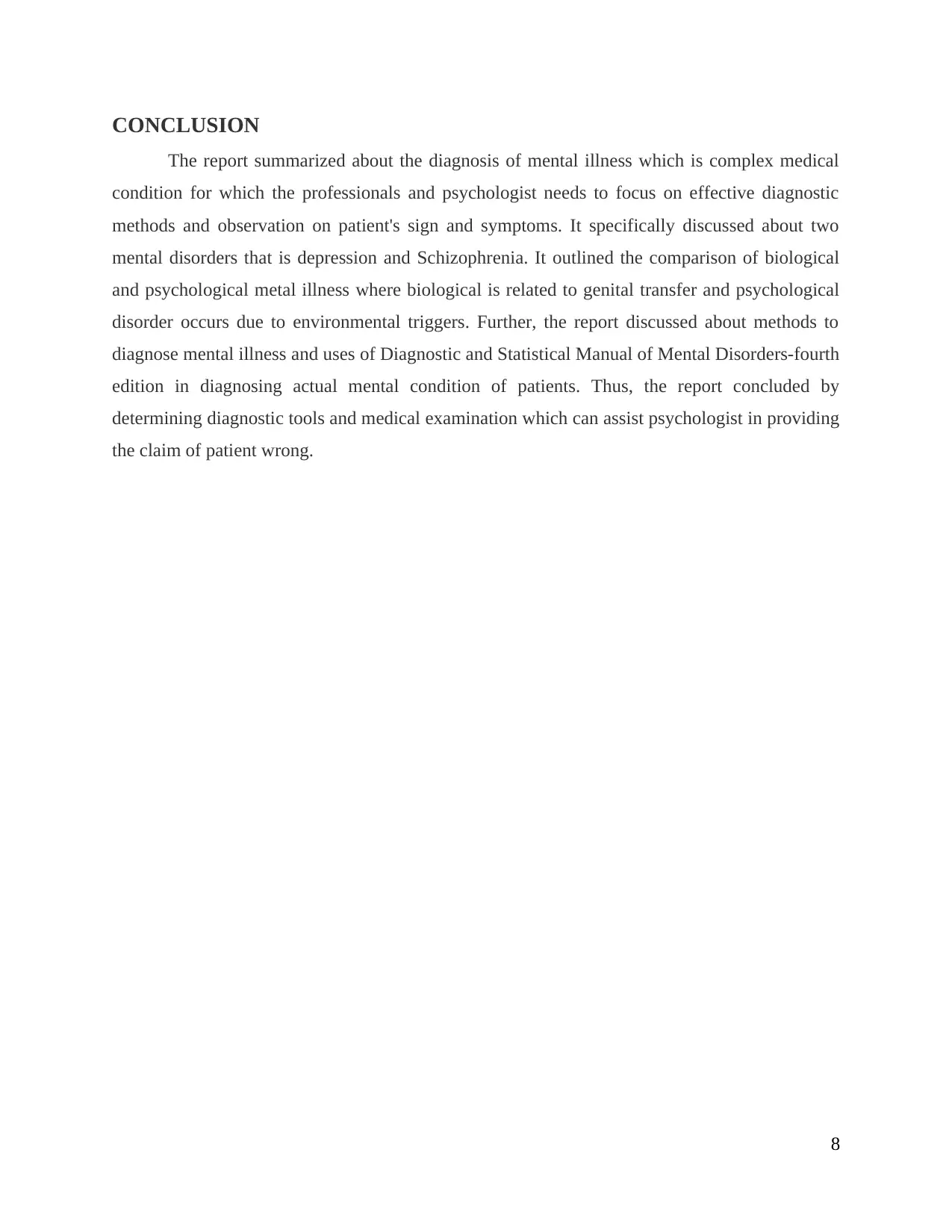
CONCLUSION
The report summarized about the diagnosis of mental illness which is complex medical
condition for which the professionals and psychologist needs to focus on effective diagnostic
methods and observation on patient's sign and symptoms. It specifically discussed about two
mental disorders that is depression and Schizophrenia. It outlined the comparison of biological
and psychological metal illness where biological is related to genital transfer and psychological
disorder occurs due to environmental triggers. Further, the report discussed about methods to
diagnose mental illness and uses of Diagnostic and Statistical Manual of Mental Disorders-fourth
edition in diagnosing actual mental condition of patients. Thus, the report concluded by
determining diagnostic tools and medical examination which can assist psychologist in providing
the claim of patient wrong.
8
The report summarized about the diagnosis of mental illness which is complex medical
condition for which the professionals and psychologist needs to focus on effective diagnostic
methods and observation on patient's sign and symptoms. It specifically discussed about two
mental disorders that is depression and Schizophrenia. It outlined the comparison of biological
and psychological metal illness where biological is related to genital transfer and psychological
disorder occurs due to environmental triggers. Further, the report discussed about methods to
diagnose mental illness and uses of Diagnostic and Statistical Manual of Mental Disorders-fourth
edition in diagnosing actual mental condition of patients. Thus, the report concluded by
determining diagnostic tools and medical examination which can assist psychologist in providing
the claim of patient wrong.
8
Paraphrase This Document
Need a fresh take? Get an instant paraphrase of this document with our AI Paraphraser
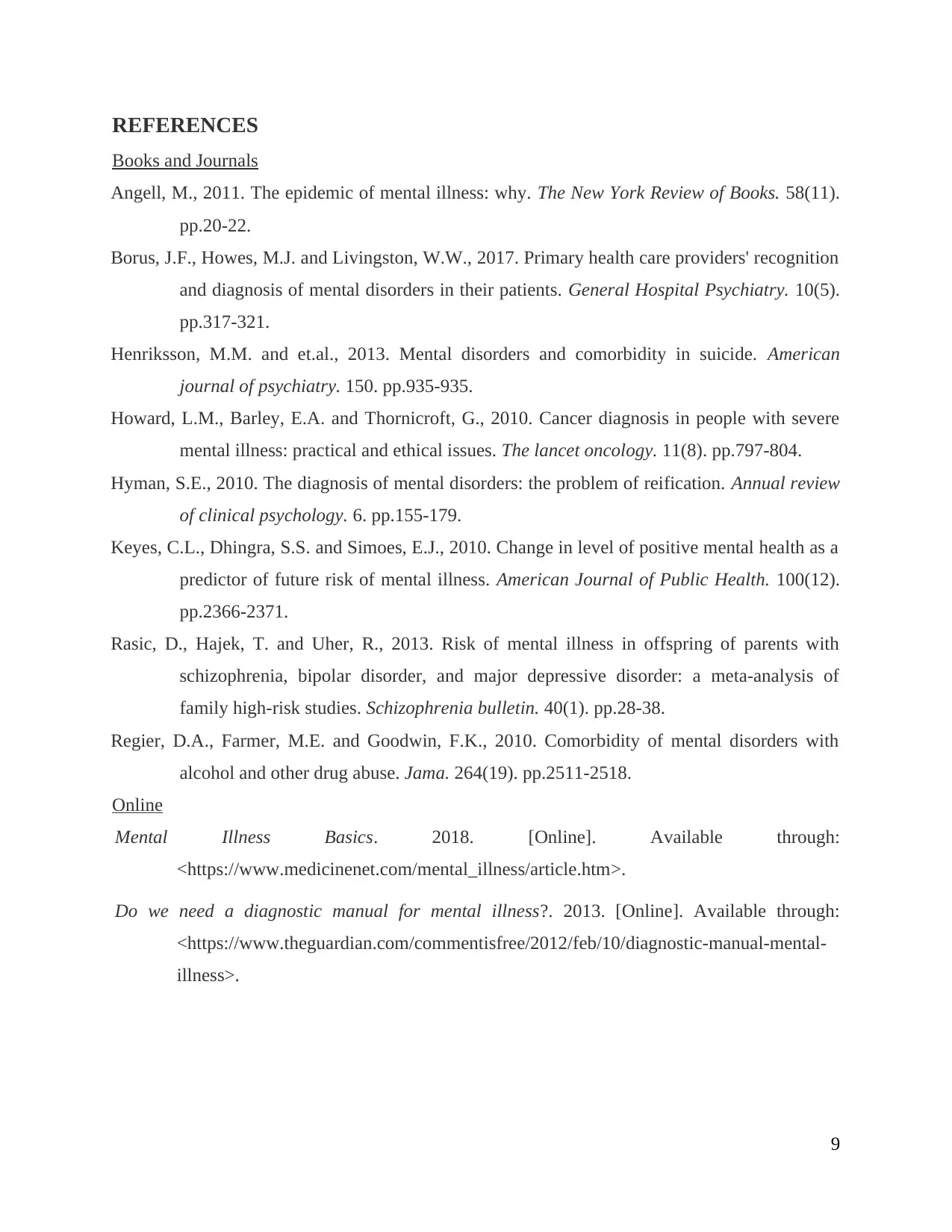
REFERENCES
Books and Journals
Angell, M., 2011. The epidemic of mental illness: why. The New York Review of Books. 58(11).
pp.20-22.
Borus, J.F., Howes, M.J. and Livingston, W.W., 2017. Primary health care providers' recognition
and diagnosis of mental disorders in their patients. General Hospital Psychiatry. 10(5).
pp.317-321.
Henriksson, M.M. and et.al., 2013. Mental disorders and comorbidity in suicide. American
journal of psychiatry. 150. pp.935-935.
Howard, L.M., Barley, E.A. and Thornicroft, G., 2010. Cancer diagnosis in people with severe
mental illness: practical and ethical issues. The lancet oncology. 11(8). pp.797-804.
Hyman, S.E., 2010. The diagnosis of mental disorders: the problem of reification. Annual review
of clinical psychology. 6. pp.155-179.
Keyes, C.L., Dhingra, S.S. and Simoes, E.J., 2010. Change in level of positive mental health as a
predictor of future risk of mental illness. American Journal of Public Health. 100(12).
pp.2366-2371.
Rasic, D., Hajek, T. and Uher, R., 2013. Risk of mental illness in offspring of parents with
schizophrenia, bipolar disorder, and major depressive disorder: a meta-analysis of
family high-risk studies. Schizophrenia bulletin. 40(1). pp.28-38.
Regier, D.A., Farmer, M.E. and Goodwin, F.K., 2010. Comorbidity of mental disorders with
alcohol and other drug abuse. Jama. 264(19). pp.2511-2518.
Online
Mental Illness Basics. 2018. [Online]. Available through:
<https://www.medicinenet.com/mental_illness/article.htm>.
Do we need a diagnostic manual for mental illness?. 2013. [Online]. Available through:
<https://www.theguardian.com/commentisfree/2012/feb/10/diagnostic-manual-mental-
illness>.
9
Books and Journals
Angell, M., 2011. The epidemic of mental illness: why. The New York Review of Books. 58(11).
pp.20-22.
Borus, J.F., Howes, M.J. and Livingston, W.W., 2017. Primary health care providers' recognition
and diagnosis of mental disorders in their patients. General Hospital Psychiatry. 10(5).
pp.317-321.
Henriksson, M.M. and et.al., 2013. Mental disorders and comorbidity in suicide. American
journal of psychiatry. 150. pp.935-935.
Howard, L.M., Barley, E.A. and Thornicroft, G., 2010. Cancer diagnosis in people with severe
mental illness: practical and ethical issues. The lancet oncology. 11(8). pp.797-804.
Hyman, S.E., 2010. The diagnosis of mental disorders: the problem of reification. Annual review
of clinical psychology. 6. pp.155-179.
Keyes, C.L., Dhingra, S.S. and Simoes, E.J., 2010. Change in level of positive mental health as a
predictor of future risk of mental illness. American Journal of Public Health. 100(12).
pp.2366-2371.
Rasic, D., Hajek, T. and Uher, R., 2013. Risk of mental illness in offspring of parents with
schizophrenia, bipolar disorder, and major depressive disorder: a meta-analysis of
family high-risk studies. Schizophrenia bulletin. 40(1). pp.28-38.
Regier, D.A., Farmer, M.E. and Goodwin, F.K., 2010. Comorbidity of mental disorders with
alcohol and other drug abuse. Jama. 264(19). pp.2511-2518.
Online
Mental Illness Basics. 2018. [Online]. Available through:
<https://www.medicinenet.com/mental_illness/article.htm>.
Do we need a diagnostic manual for mental illness?. 2013. [Online]. Available through:
<https://www.theguardian.com/commentisfree/2012/feb/10/diagnostic-manual-mental-
illness>.
9
1 out of 11
Related Documents
Your All-in-One AI-Powered Toolkit for Academic Success.
+13062052269
info@desklib.com
Available 24*7 on WhatsApp / Email
![[object Object]](/_next/static/media/star-bottom.7253800d.svg)
Unlock your academic potential
Copyright © 2020–2026 A2Z Services. All Rights Reserved. Developed and managed by ZUCOL.





